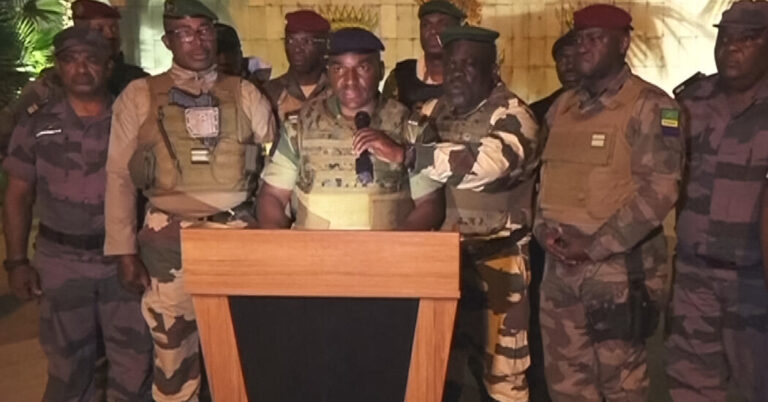A group of military officers appeared on television in the oil-rich Central African nation of Gabon early Wednesday and announced they were seizing power, less than an hour after the incumbent president, Ali Bongo Ondimba, office.
The officials, who claimed to represent the main arms of the security forces, said they were canceling the results of last weekend’s election, suspending the government and closing the country’s borders until further notice.
There was no immediate reaction from Mr. Bongo, one of France’s closest allies in Africa, or his government. Gunshots were heard in the capital, Libreville, shortly after the broadcast. Residents said the shots were coming from the same area as the president’s residence.
“We have decided to defend peace by ending the current regime,” a spokesman for the officers, mostly of the rank of colonel, told state-owned television station Gabon 24.
If it succeeds, the unexpected coup would be the latest in an extraordinary run of military takeovers in West and Central Africa – at least nine in the past three years, including one in Niger last month.
The coup was an ominous development for France, the former colonial power in Gabon. The Bongo family has been among France’s staunch allies for decades in Africa, where France’s influence is rapidly declining.
French companies dominate Gabon’s oil and timber industries, and 400 French troops are based in the country. France is following the events in Gabon “with the greatest attention,” Prime Minister Elisabeth Borne said in a statement on Wednesday.
China, which accounts for nearly half of Gabon’s exports, has also expressed concern. A foreign ministry spokesman in Beijing appealed for calm and called on “all sides” to ensure Mr. Bongo’s safety.
Eremet, a French mining group that employs 8,000 people in Gabon, said it had suspended its operations.
Many of the recent takeovers in Africa have occurred in countries destabilized by insurgent violence, such as Mali and Burkina Faso, or by internal military tensions, such as Sudan. But in Gabon, the coup seems to have targeted one of Africa’s longest-running political dynasties.
The Bongos have ruled Gabon, a country of 2.3 million people on Africa’s Atlantic coast, for more than half a century. Mr. Bongo, 64, will begin his third term since becoming president in 2009. He succeeds his father, Omar Bongo, who has been in power since 1967.
Last weekend’s vote was tense, with strong opposition claims of fraud and fears that, as in many previous elections in Gabon, it would end in violence. Many people left the capital for the weekend, fearing trouble. After the polls closed, the government imposed a nightly curfew and restricted internet access.
At around 3 a.m. on Wednesday, the national electoral authority declared on television that Mr. Bongo had won the election with 65 percent of the vote. It said his main rival, Albert Ondo Ossa, got 31 percent.
But a few minutes later, gunshots were heard in the center of the city. Shortly thereafter, about a dozen mutinous officers appeared on Gabon 24 and announced that they were “putting an end to the regime.”
A spokesman for the group, which called itself the Committee for the Transition and Restoration of Institutions, denounced what he called “irresponsible and unpredictable governance” under Mr. Bongo that “ran the risk of leading the country into chaos.”
“People of Gabon, we are finally on the road to happiness,” the spokesman said.
The statement offered few clues about the group, its level of support throughout the military or its intentions for Gabon, which The seventh largest oil producer in Africa and member of OPEC.
Many of the putschists wore the uniforms of the Republican Guard, the elite unit charged with protecting the president. Residents identified one as Mr. Bongo’s former aide-de-camp.
The coup attempt came as a complete surprise to many in Libreville, where residents awoke Wednesday to news of potentially significant change after half a century under the Bongo family. Despite this, there was a semblance of normalcy in the center of the city, where some shops opened and traffic moved. The internet works.
A spokesman for Mr. Bongo could not be reached.
President Emmanuel Macron of France hosted the French-educated Mr. Bongo in Paris in June, when the two leaders were seen smiling together. It was a welcome show of solidarity at a time when France is grappling with a wave of anti-French sentiment among its former African colonies.
In Mali and Burkina Faso, recently installed military juntas have forced Paris to withdraw its diplomats and thousands of soldiers. France has backed threats by a bloc of West African states to take military action against the junta in Niger, which has held the ousted president, Mohamed Bazoum, since he was ousted in late July. And last week the junta ordered the French ambassador, Sylvain Itte, to leave on Sunday night. This Tuesday, he is still in the country.
In recent years, Gabon has emerged as a leader in the lucrative new market for carbon credits. Nearly 90 percent of the country is covered by rainforest, an asset Mr. Bong sought to monetize through the sale of carbon credits. potentially worth billions of dollars to foreign businesses and governments.
Despite those riches, poverty is endemic in Gabon, where half the population is under 20 years old. Almost 40 percent of Gabonese aged 15 to 24 are unemployed, according to the World Bank.
Elian Peltier contributed reporting from Niamey, Niger.
